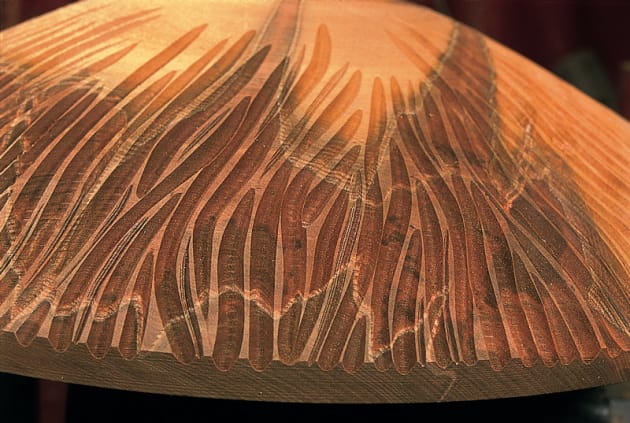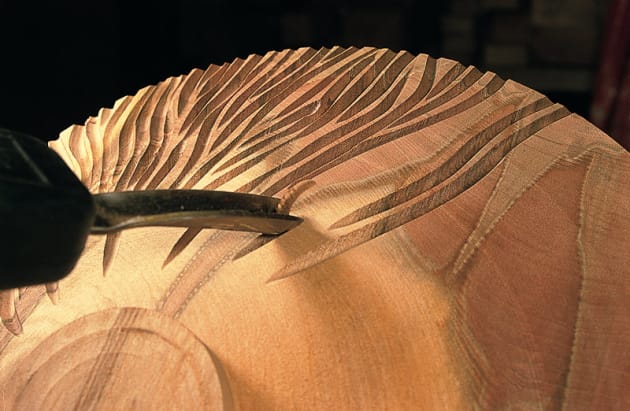Turned and Textured
Words and photos: Andrew Potocnik
Receiving a perfect piece of Tasmanian leatherwood, I found myself wondering how to highlight the beautiful streaky patterns revealed when its surface was scraped back. The look of its growth rings and general texture reminded me of sassafras. Eventually I settled on a simple conical bowl form that I would carve and texture. This would be supported by a fairly crude base intended to give a primitive ceremonial feel.
Mounted to a faceplate, the underside was rough-turned leaving some stock by which the form could be held in reverse. Once transferred to a bench vice, I created wavy lines of the underside with an Arbortech power chisel.
Finer detail lines were carved by hand with a veining tool (photo 1). The leatherwood carved as most green timbers do.
Reversed into the scroll chuck, the interior was hollowed and a detail step cut into the opening of the bowl to clearly define the outer edge, later to be carved. The inner bowl was significantly undercut (photo 2) to remove as much bulk as possible (I was worried the wood might crack on account of its considerable moisture content).
An under-cutter allowed me to work right in under the lip, removing timber with ease, although I had to explore various cutting angles to ensure a clean surface. There were times when endgrain did not cut cleanly and scraping left a poor surface on the green timber.
The top and interior surfaces were sanded. The inside edge of the rim was painted black to form a visual break between surfaces (photo 3) and then carved.

The bottom of the bowl was next finished. By this stage distortion was quite substantial, measuring 307mm along the grain compared to 286mm across the form. Later, it settled at 306 x 268mm, a massive 38mm difference or 12.5%. Having been very green when first mounted on the lathe, the bowl dried to 570gm, losing one sixth of its weight.
The stand was made of two separate sections. The crescent form came from a partly resolved sculptural piece set aside some time ago awaiting a solution. The centre was shaped to reflect the bottom of the bowl. Newly shaped sections were textured to match the burnt centre.
The base was made of redgum, bandsawn to shape. Off-cuts from one face were taped back into place to enable safe cutting of the second face. Once sanded to size on a linisher, I drilled holes which were enlarged with a power chisel to form a rectangular cavity.
The intent was quite simple. A solid base would appear quite heavy and block-like. An opening not only lightened it physically and visually, but also allowed an interior view, a kind of window into the form and its material. However, when I looked at the assembly I wasn’t happy with what I saw. The stand looked too tall and needed a drastic change.
One option was to texture the redgum base by heavily burning and wire brushing it to expose the grain. To the crescent-shaped section I added several curved bandsaw cuts which were burnt to enlarge and round off their sharp edges. I left the piece for a day to two, giving me time to think and finally went back to my original idea.
I opted for an oil finish which really highlighted the black colour of the base. I wiped polyurethane on and off the bowl and needed plenty of elbow grease to clear the excess finish from the carved grooves.

Viewing the finished piece I quite like the carved texture and am fairly happy with the stand, but I’m not convinced it’s totally resolved. The leatherwood was generally easy to work, needing extra effort to achieve a smooth surface on endgrain, but the striped colouring made this worth the effort.
Learn more about Andrew Potocnik here.






